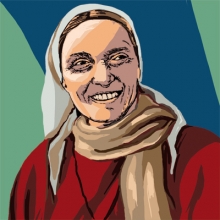Małgorzata was born in a not well-off intelligentsia family. Her parents came from Warsaw, they participated in the Warsaw Rising in 1944. They met after World War II. They were not very religious.
Her father was a doctor. At first, he worked in the army. He gave up his uniform willfully. Thus, he could not find a job for a long period of time. He did not have good chances to become very successful because he refused to join the communist party. He believed his job was a mission. He treated patients in poor villages. He did not take money from the poorest patients. Małgorzata’s mother worked in a school. After her husband left her for another woman, she became very religious. However, she did not become a devotee. Her catholicism consisted in helping everybody around her. She kept saying: ‘Others first.’
Chmielewska chose a catholic boarding school since she wanted to live in the countryside. The school was run by nuns. A few youthful pranks, revolts against the discipline and sisters were furious. Insubordinate Małgorzata left after a year.
She learned how to be resourceful and dedicated to what she was doing when she was a scout. She met Father Gniewianek, who was adored by youth, especially by youngsters coming from families affected by alcoholism and poverty. The young created a community, participated in canoe camps together, during which they played and prayed (which was illegal in a communist Poland). The older children took care of the younger ones. During that time Małgorzata learned a lot about life and found great friends.
After her studies, she started teaching in a school. Simultaneously, she felt a desire to contemplate. She was into mystique. She was considering joining a convent. She did not do that because she decided to take care of her pupil, a deaf and almost blind girl who was about to be put in a special school.
Soon after, she lost her job and apartment because she did not vote in elections (it was obligatory to vote in Poland at the time). She got a job as a religion teacher in a school for disabled children. Although she was the one teaching, she felt she was being evangelized herself. She admits that at the time she realized that disabled children are real because they are not able to cheat.
She stopped smoking and drinking. She started going to church every day. Before she was 30 years old, she joined the congregation of Little Sisters of Jesus. Her family was furious. Her friends thought she was mad.
During her period of probation in Rome, she met Mother Teresa and other people from all over the world who decided not only to talk about their love for the poor, but also live with them. When she returned to her convent in Poland, she decided to act herself. Next to the Little Sisters of Jesus convent, an old woman was dying. Małgorzata took care of her. She often slept at the woman’s place. Other sisters were disgusted.
Thus, Małgorzata left the convent and returned to Warsaw. She wanted to do something for others. She started by helping the disabled, the sick, later, also prisoners. The members of the Solidarity movement discovered what she was doing and decided to support her financially.
In 1989, when the communist era drew to an end in Poland, everybody expected amnesty. Many prisoners did not have a place they could go to. Since it is harder for homeless women to survive than it is for homeless men, Małgorzata together with her friend decided to set up a house for them. Later, she created another one for men.
At the time, Małgorzata Chmielewska met Pascal Pingault, a former hippie and anarchist, who was fascinated with the lives of the first Christians and converted to Christianity. He established the Bread of Life organization. Sister Małgorzata decided to establish the house of the Bread of Life in Poland. She takes care of the homeless.
The beginning was very hard – wherever they went, neighbors were suspicious. They did not approve of ‘the community of alcoholics and prostitutes.’ Sister Małgorzata has been in charge of her houses for 20 years. Nowadays, she has seven houses: for the sick, the old, the disabled, homeless women and men. In addition to shelter, the residents receive social, medical and financial aid. They live very modest lives. Sometimes they do not have anything to eat. When they have, they share it equally. In each of the houses, there are the same rules. They always eat and keep their house together. Alcohol is not tolerated. When you drink once, you can come back after 24 hours. If you drink again, you have to leave.
Sister Małgorzata believes in social economy. With a view of the neighbors, she set up a manufactory – fruit processing plant, sewing and carpentry workshops – which provides employment and income that is spent on social activities.
Małgorzata’s closest coworker says Chmielewska is a unique nun. Sister Małgorzata is known to be demanding. She is able to scold the residents of her houses as well as to swear harshly. It has become proverbial that after leaving the Little Sisters of Jesus, she worked as a cleaning lady in a bakery. When baker’s assistants were pinching her, she slammed them in their faces.
Małgorzata Chmielewska has adopted four children. She will be taking care of one of them till the end of her life.

